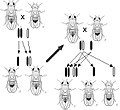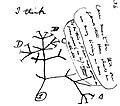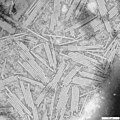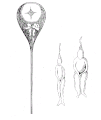Portal:Biology
Introduction
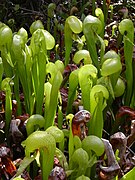

Biologists are able to study life at multiple levels of organization, from the molecular biology of a cell to the anatomy and physiology of plants and animals, and evolution of populations. Hence, there are multiple subdisciplines within biology, each defined by the nature of their research questions and the tools that they use. Like other scientists, biologists use the scientific method to make observations, pose questions, generate hypotheses, perform experiments, and form conclusions about the world around them.
Life on Earth, which emerged more than 3.7 billion years ago, is immensely diverse. Biologists have sought to study and classify the various forms of life, from
Selected article -
Selected picture -

An embryo is a
Major topics
Selected biography -
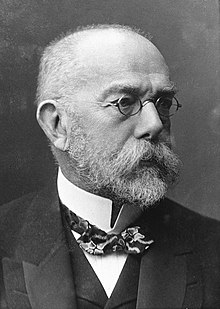
General images -
-
sex linked inheritance of the white eyed mutation in the fruit fly Drosophila in 1910, implying the gene was on the sex chromosome. (from History of genetics)
-
Some biodiversity loss is more insidious than others due to systemic neglect. For example, sport killing and wanton waste of tons of native fishes from unregulated 21st century bowfishing in the United States. New conservation movements are needed to deter irreparable biodiversity loss to fragile freshwater ecosystems. (from Conservation biology)
-
The frontispiece to Erasmus Darwin's evolution-themed poem The Temple of Nature shows a goddess pulling back the veil from nature (in the person of Artemis). Allegory and metaphor have often played an important role in the history of biology. (from History of biology)
-
Charles Darwin's first sketch of an evolutionary tree from his First Notebook on Transmutation of Species (1837) (from History of biology)
-
Wendell Stanley's crystallization of tobacco mosaic virus as a pure nucleoprotein in 1935 convinced many scientists that heredity might be explained purely through physics and chemistry. (from History of biology)
-
2016 conservation indicator which includes the following indicators: marine protected areas, terrestrial biome protection (global and national), and species protection (global and national) (from Conservation biology)
-
In the course of his travels, Alexander von Humboldt mapped the distribution of plants across landscapes and recorded a variety of physical conditions such as pressure and temperature. (from History of biology)
-
De arte venandi, by Frederick II, Holy Roman Emperor, was an influential medieval natural history text that explored bird morphology. (from History of biology)
-
Statue ofgerm theory of diseases, therefore creating the scientific basis of public health, saving millions of lives. For his life's work Koch is seen as one of the founders of modern medicine. (from History of biology)
-
Blending Inheritance (from History of genetics)
-
Mendelian inheritance states characteristics are discrete and are inherited by the parents. This image depicts a monohybrid cross and shows 3 generations: P1 generation (1), F1 generation (2), and F2 generation (3). Each organism inherits two alleles, one from each parent, that make up the genotype. The observed characteristic, the phenotype, is determined by the dominant allele in the genotype. In this monohybrid cross the dominant allele encodes for the colour red and the recessive allele encodes for the colour white. (from History of genetics)
-
A Genentech-sponsored sign declaring South San Francisco to be "The Birthplace of Biotechnology." (from History of biotechnology)
-
Efforts are made to preserve the natural characteristics of Hopetoun Falls, Australia, without affecting visitors' access. (from Conservation biology)
-
Inside of a 48-well thermal cycler, a device used to perform polymerase chain reaction on many samples at once (from History of biology)
-
Synthetic insulin crystals synthesized using recombinant DNA technology (from History of biotechnology)
-
Gregor Mendel, "father of modern genetics". (from History of biology)
-
Frontispiece to a 1644 version of the expanded and illustrated edition of Historia Plantarum, originally written by Theophrastus around 300 BC (from History of biology)
-
Diagram ofgemmules, which migrate to the gonads and contribute to the fertilised egg and so to the next generation. The theory implied that changes to the body during an organism's life would be inherited, as proposed in Lamarckism. (from History of genetics)
-
Aristotle's model of transmission of movements from parents to child, and of form from the father. The model is not fully symmetric. (from History of genetics)
-
A pie chart image showing the relative biomass representation in a rain forest through a summary of children's perceptions from drawings and artwork (left), through a scientific estimate of actual biomass (middle), and by a measure of biodiversity (right). The biomass of social insects (middle) far outweighs the number of species (right). (from Conservation biology)
-
Age of Exploration, naturalists had little idea of the sheer scale of biological diversity. (from History of biology)
-
Description of rare animals (写生珍禽图), by Huang Quan (903–965) during the Song dynasty. (from History of biology)
-
August Weismann's germ plasm theory. The hereditary material, the germ plasm, is confined to the gonads. Somatic cells (of the body) develop afresh in each generation from the germ plasm. (from History of genetics)
-
An art scape image showing the relative importance of animals in a rain forest through a summary of (a) child's perception compared with (b) a scientific estimate of the importance. The size of the animal represents its importance. The child's mental image places importance on big cats, birds, butterflies, and then reptiles versus the actual dominance of social insects (such as ants). (from Conservation biology)
-
Clay models of animal livers dating between the nineteenth and eighteenth centuries BCE, found in the royal palace at Mari (from History of biology)
-
Penicillin was viewed as a miracle drug that brought enormous profits and public expectations. (from History of biotechnology)
-
Innovative laboratory glassware and experimental methods developed by Louis Pasteur and other biologists contributed to the young field of bacteriology in the late 19th century. (from History of biology)
-
Thomas Hunt Morgan's illustration of crossing over, part of the Mendelian-chromosome theory of heredity (from History of biology)
-
In Micrographia, Robert Hooke had applied the word cell to biological structures such as this piece of cork, but it was not until the 19th century that scientists considered cells the universal basis of life. (from History of biology)
-
A biomedical work by Ibn al-Nafis, an early adherent of experimental dissection who discovered the pulmonary and coronary circulation (from History of biology)
-
Brewing was an early example of biotechnology (from History of biotechnology)
-
Summary of 2006Extinct in the Wild) — CR (Critically Endangered) — EN (Endangered) — VU (Vulnerable) — NT (Near Threatened) — LC (Least Concern) (from Conservation biology)
-
Carefully engineered strains of the bacterium Escherichia coli are crucial tools in biotechnology as well as many other biological fields. (from History of biology)
-
)
-
The "central dogma of molecular biology" (originally a "dogma" only in jest) was proposed by Francis Crick in 1958. This is Crick's reconstruction of how he conceived of the central dogma at the time. The solid lines represent (as it seemed in 1958) known modes of information transfer, and the dashed lines represent postulated ones. (from History of biology)
-
More conservation research is needed for understanding ecology and behaviour of the dhole in central China. (from Conservation biology)
Did you know -

- ... that the p19 protein (dimer pictured) evolved in an arms race between plants and viruses?
- ...that there are about a million ?
- ... that the semi-aquatic grasshopper water hyacinth?
Things you can do
|
Here are some Open Tasks :
|
Related portals
Biology portals
Categories

Anatomy - Anthropology - Astrobiology - Biochemistry - Bioengineering - Bioinformatics - Biotechnology - Botany - Cell biology - Conservation biology - Developmental biology - Ecology - Environmental science - Evolutionary biology - Genetics - Mathematical biology - Medicine - Microbiology - Immunology - Molecular biology - Mycology - Neuroscience - Paleontology - Palynology Parasitology - Pharmacology -
Phylogenetics - Physiology - Systems biology - Taxonomy - Toxicology - Virology - ZoologyMore topics
WikiProjects

- Computational biology
- Conservation worldwide
- Ecology
- Ecoregions
- Evolutionary biology
- Genetics
- History of Science
- Marine life
- Medicine
- Microbiology
- Molecular and Cellular Biology
- Neuroscience
- Tree of Life
A complete list of scientific WikiProjects can be found here. See also Wikispecies, a Wikimedia project dedicated to classification of biological species.
Associated Wikimedia
The following Wikimedia Foundation sister projects provide more on this subject:
-
Commons
Free media repository -
Wikibooks
Free textbooks and manuals -
Wikidata
Free knowledge base -
Wikinews
Free-content news -
Wikiquote
Collection of quotations -
Wikisource
Free-content library -
Wikiversity
Free learning tools -
Wiktionary
Dictionary and thesaurus


